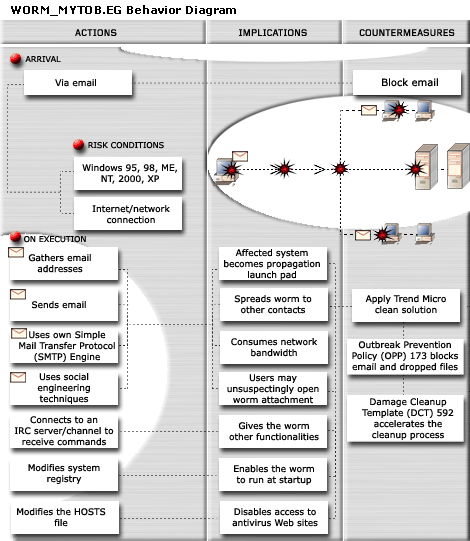
The infection of 4,700 PCs by a worm at three London hospitals in mid-November was "entirely avoidable," according to an independent security review.
The PCs at St. Bartholomew's, the Royal London Hospital and The London Chest Hospital were infected with Mytob, a mass-mailing worm also known as MyDoom. Emergency patients were temporarily diverted to other facilities, but officials said no personal data was lost.
After the infection, the hospitals commissioned a specialist IT consultancy to analyze the incident. Although the full report is not public due to security concerns, a summary of its findings has been released.
The review concluded there was a "substantive failure" in the medical group's information governance processes. Antivirus software on the PCs was updated on a daily basis prior to the attack, but the software was not configured correctly on some PCs.
"This left a 'back door' for the virus to infiltrate the network," the review said.
Mytob was "introduced accidentally" into the hospitals' networks and there was no "malicious intent," the review said.
The hospitals' PCs were running McAfee 8.5 antivirus software, a product also known as VirusScan Enterprise. Most antivirus products -- including that McAfee product -- can detect and remove Mytob, but the malware continues to circulate on the Internet despite its discovery in early 2005.
After the infection, the hospitals declared an "internal major incident" on Nov. 18 until Nov. 24. Most PCs were cleared of the infection and working again by early December.
The hospitals are now embarking on a program to shore up management systems and processes, the review said. The program calls for additional staff training and changes to command and control structures, among other measures, and should be complete by April.
Although patients were not severely affected, the review notes "this incident could have threatened the well-being of patients and morale of staff as well as the long-term reputation" of the hospitals.
U.K. hospitals are not the only organizations to be severely hit by common infections. In mid-January, the U.K. Ministry of Defence was hit with a rapidly-spreading virus that forced administrators to shut down systems across the organization, cutting off e-mail and Web access.
The Ministry said war-fighting systems were not affected. It did not release details of the specific type of malware, but said it did not appear to be intentionally targeting military systems.
(PC World)
 Total Members: 14197
Total Members: 14197 Latest: Levine
Latest: Levine Total Posts: 43431
Total Posts: 43431 Total Topics: 16526
Total Topics: 16526 Online today: 2962
Online today: 2962 Online ever: 51419
Online ever: 51419 Total Members: 14197
Total Members: 14197 Latest: Levine
Latest: Levine Total Posts: 43431
Total Posts: 43431 Total Topics: 16526
Total Topics: 16526 Online today: 2962
Online today: 2962 Online ever: 51419
Online ever: 51419